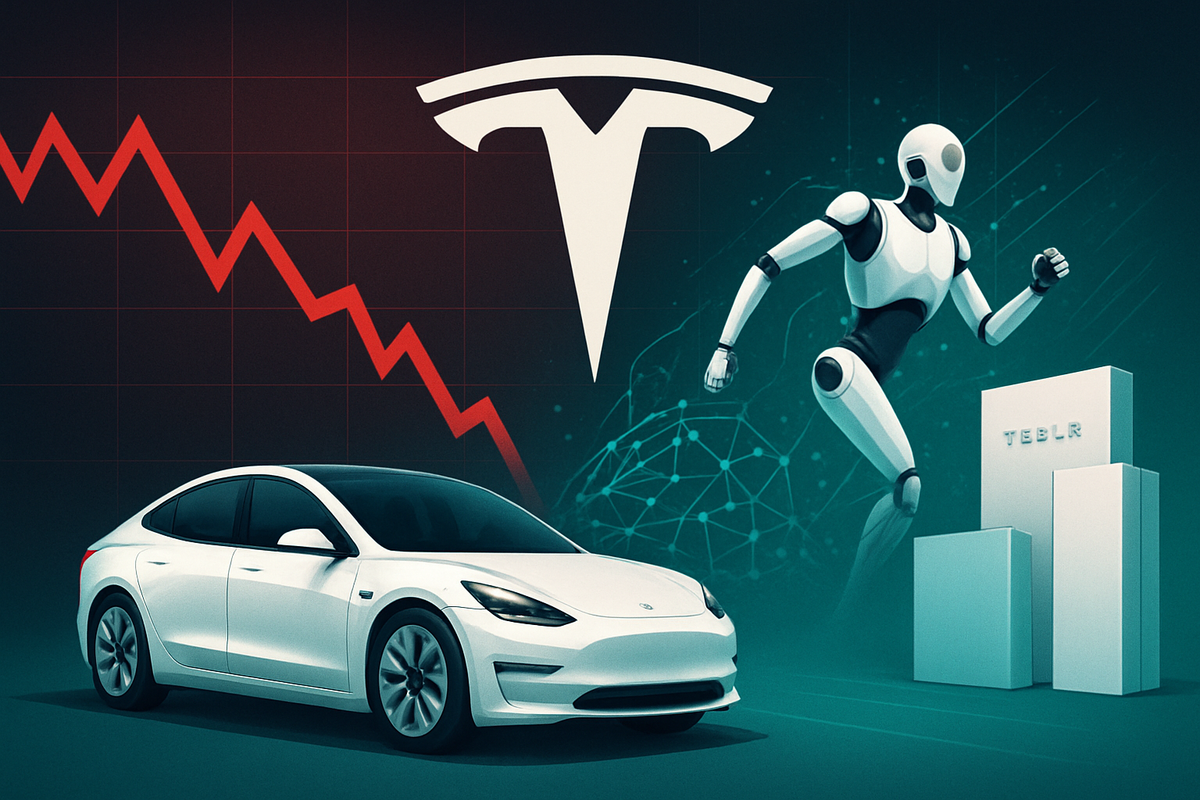Tesla's Paradox: Stock Dips Despite Analyst Upgrade to 'Hold'

On October 24, 2025, electric vehicle giant Tesla Motors (NASDAQ: TSLA) experienced an unexpected 3.12% dip in its stock price, a movement that initially seemed counterintuitive given a significant analyst action. Freedom Capital Markets, a prominent investment bank, had upgraded its rating on Tesla from a previous 'Sell' to 'Hold', simultaneously raising its price target from $338.00 to $406.00. This seemingly positive re-evaluation by the analyst firm, driven by optimism around Tesla's burgeoning new segment potential, failed to translate into immediate positive market momentum, leaving investors and observers to ponder the underlying dynamics at play.
The market's lukewarm, if not outright negative, reaction to an improved analyst outlook underscores a complex interplay of investor expectations, broader market sentiment, and persistent valuation concerns surrounding the innovative but often volatile automaker. While Freedom Capital Markets cited Tesla's stabilization in EV deliveries and promising strides in areas like affordable new models, autonomous driving, robotics, and energy storage as reasons for its more optimistic stance, the stock's decline suggests that a 'Hold' rating, while an improvement, may not have met the higher expectations of a 'Buy' rating that some bullish investors might have anticipated. This paradoxical reaction highlights the nuanced challenges even market leaders face in a rapidly evolving financial landscape.
Freedom Capital Markets Shifts Stance, Market Remains Wary
Freedom Capital Markets' decision on October 24, 2025, marked a notable shift in its perspective on Tesla Motors (NASDAQ: TSLA). Previously holding a 'Sell' rating, the firm upgraded its view to 'Hold', a move accompanied by a substantial increase in its price target from $338.00 to $406.00. This adjustment came in the wake of Tesla's third-quarter results for 2025, which reportedly reinforced the analyst firm's belief that the company is nearing the realization of its potential in new, diversified segments. Specific reasons cited for this more optimistic, albeit still cautious, outlook included the stabilization of electric vehicle delivery volumes after a weaker first half of 2025, with expectations for a return to growth in upcoming quarters, and strong Q3 revenue figures of $28.1 billion, surpassing both internal and consensus estimates.
Despite these positive underlying factors and the analyst upgrade, Tesla's stock dipped by 3.12% on the day. This unexpected downturn suggests that while an upgrade from 'Sell' to 'Hold' is generally a positive signal, it might not have been sufficient to overcome prevailing market pressures or investor expectations for a high-growth, high-valuation stock like Tesla. For many investors, a 'Hold' rating, while indicating that the stock is no longer considered significantly overvalued or at high risk of decline, does not actively encourage new buying. It often implies that the stock is fairly valued at its current price, and significant upside may be limited in the short term.
The market's reaction could also be influenced by a combination of factors, including broader macroeconomic concerns, profit-taking by investors who have seen the stock run up, or other concurrent news that overshadowed the positive aspect of the analyst upgrade. For a company frequently trading at premium valuations (e.g., a P/E ratio of 256 as of early October 2025), investors often seek a more definitive 'Buy' signal to justify further investment. The 'Hold' rating, therefore, might have been interpreted as a signal of caution, contributing to the stock's dip rather than fueling a rally.
Freedom Capital Markets, a boutique investment bank established in 2022 and the investment banking arm of Prime Executions, Inc. (a subsidiary of Freedom Holding Corp. (NASDAQ: FRHC)), plays a significant role in providing research across key growth sectors. Their analysis, while now less bearish, still reflects a nuanced view of Tesla, acknowledging its operational strengths and future potential while maintaining a degree of prudence on its immediate investment appeal. This move brings Freedom Capital Markets' stance closer to the broader analyst consensus of 'Hold' for Tesla, though their new price target of $406.00 remains above the median consensus of $367.50.
Tesla's Diversification: Winners and Losers in the New Horizon
Freedom Capital Markets' upgrade of Tesla Motors (NASDAQ: TSLA) to 'Hold', driven by its "new segment potential," casts a spotlight on how the electric vehicle giant's diversification strategy could reshape its market perception and the competitive landscape. While the immediate stock dip suggests ongoing valuation scrutiny, the long-term implications of Tesla's ventures into affordable EVs, Full Self-Driving (FSD), robotics, and energy storage are profound for both the company and its rivals.
For Tesla (NASDAQ: TSLA) itself, success in these new segments could fundamentally alter its investment appeal. Emphasizing forward-looking growth beyond just premium automotive sales, these ventures could diversify revenue streams and potentially reduce the stock's volatility. Positioning itself as a broader technology and energy company, rather than solely an automaker, reinforces its image as an innovation leader, attracting investors keen on disruptive technologies. However, failure to execute on these ambitious plans could exacerbate valuation concerns and further pressure its stock. The company's ability to demonstrate tangible progress and profitability in these areas will be crucial in solidifying its long-term investment case.
The push into affordable EVs presents a direct challenge to a wide array of competitors. Traditional automakers like Hyundai (KRX: 005380), Kia (KRX: 000270), Ford (NYSE: F), Volkswagen (FWB: VOW), and Chevrolet (NYSE: GM), along with Chinese manufacturers such as BYD (HKG: 1211) and XPeng (NYSE: XPEV), are already fiercely competing in the mid-range and budget EV categories. If Tesla successfully launches its rumored "Model 2" or "Model Q" at a significantly lower price point, it could intensify price wars, forcing competitors to accelerate cost reductions, innovate more rapidly, or risk losing market share. Companies without Tesla's scale or vertical integration may find their margins severely squeezed.
In the realm of autonomous driving, Tesla's FSD system continues to be a contentious but highly watched area. Competitors like Waymo (NASDAQ: GOOGL), Cruise (NYSE: GM), and Mobileye (NASDAQ: MBLY), along with other traditional automakers, are investing heavily in their own autonomous technologies. Should Tesla achieve widespread regulatory approval and demonstrate truly unsupervised FSD capabilities, it could set a new industry benchmark, pressuring rivals to match its advancements or risk falling behind. This could lead to increased R&D spending, strategic partnerships, or even consolidation within the autonomous driving sector.
Tesla's foray into humanoid robotics with Optimus pits it against specialized robotics companies like Figure AI, Agility Robotics, and Boston Dynamics. If Optimus can be mass-produced and deployed effectively across various industries, it could disrupt manufacturing, logistics, and services, creating new efficiencies and revenue streams for Tesla. This would exert immense pressure on existing robotics firms to accelerate their development, specialize further, or find niche applications to survive in a market potentially dominated by a scalable general-purpose robot.
Finally, in energy storage, Tesla's Powerwall, Powerpack, and Megapack solutions are already strong players, but the market is growing competitive with alternatives from LG Chem (KRX: 051910), Enphase (NASDAQ: ENPH), Generac (NYSE: GNRC), and others. Continued innovation and growth in Tesla's energy segment, especially with new products like Megablock and Megapack 4, could solidify its leadership. This would compel competitors to enhance their battery technology, improve integration with smart home and EV charging systems, and offer more competitive pricing and warranties to maintain their market presence. The rising trend of vehicle-to-everything (V2X) charging also opens new competitive avenues, as EVs themselves become mobile power storage units.
Broader Implications: Navigating a Maturing EV Landscape
Freedom Capital Markets' upgrade of Tesla Motors (NASDAQ: TSLA) to 'Hold' on October 24, 2025, while seemingly positive, highlights broader industry trends impacting both the electric vehicle (EV) and technology sectors. The analyst's nuanced stance—moving from 'Sell' but not to 'Buy'—reflects an increasingly complex market where high-growth narratives are being met with greater scrutiny on profitability and sustainable business models.
This action fits squarely into the maturing EV market, which by late 2025 is experiencing decelerating, albeit still record, sales growth. Competition has intensified dramatically, with legacy automakers like Ford (NYSE: F) and General Motors (NYSE: GM), alongside new entrants and particularly aggressive Chinese manufacturers like BYD (HKG: 1211), rapidly expanding their EV offerings. Tesla's once-unassailable market share has seen erosion, forcing the company into aggressive price cuts that have impacted its gross and operating margins. An analyst firm's 'Hold' rating, even with a raised price target, signals that while Tesla's potential is acknowledged, its current valuation may already fully price in these opportunities, while immediate profitability challenges persist.
The wider tech sector is also undergoing a similar transformation. While innovation in AI, autonomous systems, and robotics continues at a breakneck pace, investors are increasingly demanding tangible returns on investment. Companies are under pressure to demonstrate clear paths to profitability from their AI ventures, moving beyond hype to concrete applications and scalable business models. Tesla's push into Optimus robots and advanced FSD aligns with this trend, but the execution and commercialization of these technologies remain significant hurdles.
Potential ripple effects on competitors and partners are considerable. For other EV manufacturers, particularly pure-plays, Tesla's 'Hold' rating could reinforce investor caution across the sector, especially if they face similar margin pressures or slower growth. Legacy automakers, with their diversified revenue streams and established manufacturing bases, might be viewed as more stable investments in a maturing EV market. Suppliers to Tesla, involved in critical components like batteries, sensors, and AI chips, could face increased scrutiny on their revenue projections if Tesla's growth trajectory or profitability faces prolonged challenges.
Historically, high-growth sectors have often experienced periods where market enthusiasm outpaced fundamental realities. The dot-com bubble of the late 1990s serves as a stark precedent, where many tech companies commanded astronomical valuations with little to no profitability. When analysts eventually shifted from 'Buy' to 'Hold' or 'Sell' ratings, it often amplified market corrections. While Tesla's situation is distinct, the emphasis on future potential over current profitability, coupled with intense competition and macroeconomic headwinds, draws parallels to these historical cycles where market sentiment eventually reconciles with financial performance. The 'Hold' rating, therefore, serves as a crucial inflection point, urging investors to weigh future promise against present challenges.
The Road Ahead: Navigating Innovation and Market Scrutiny
Freedom Capital Markets' upgrade of Tesla Motors (NASDAQ: TSLA) to 'Hold' on October 24, 2025, despite the immediate market dip, sets the stage for a critical period for the electric vehicle and technology giant. The coming months and years will test Tesla's ability to translate its ambitious "new segment potential" into sustainable growth and profitability, while navigating intense market scrutiny and competition.
In the short term, Tesla is likely to face continued stock volatility. The market will be closely watching its Q4 2025 performance, particularly how the expiration of the $7,500 US federal EV tax credit impacts demand and delivery volumes. Investors will also scrutinize profit margins, which have been pressured by aggressive price cuts and rising R&D costs. Any further regulatory investigations into its Full Self-Driving (FSD) system or other safety concerns could also trigger negative market reactions. Tesla's ability to manage costs, optimize production for its existing and upcoming models, and maintain positive cash flow will be paramount in stabilizing investor confidence.
Looking at the long term, Tesla's strategic pivots towards becoming a "real-world AI" company are crucial. The success of its affordable EV models, such as the rumored "Model 2" or "Model Q," will be vital for capturing a larger market share and boosting sales volumes in a competitive landscape. More importantly, the commercialization and widespread adoption of its FSD technology and robotaxi services, as well as the scaling of its Optimus humanoid robot production, represent enormous market opportunities. These ventures, if successful, could significantly diversify Tesla's revenue streams and justify its high valuation beyond its core automotive business. The energy storage segment, already a strong performer with products like Powerwall and Megapack, is expected to continue its robust growth, providing a steady, high-margin revenue stream.
Potential strategic pivots or adaptations required for Tesla include a continued aggressive focus on cost reduction across all its operations, especially as it ramps up production of more affordable vehicles. It may need to accelerate partnerships, particularly for FSD regulatory approvals in diverse markets, and for specialized components in its robotics division. Diversifying its supply chain to mitigate the impact of tariffs and geopolitical tensions will also be critical. Furthermore, Tesla might need to refine its communication strategy to better articulate the value proposition and progress of its nascent AI and robotics ventures to a skeptical market.
Market opportunities include the ever-expanding global demand for EVs, particularly in emerging markets, and the accelerating transition to renewable energy grids, which will fuel demand for Tesla's energy storage solutions. The burgeoning AI and automation revolution presents a colossal opportunity for FSD and Optimus, potentially creating new industries and revenue streams that could dwarf its current automotive earnings. However, significant challenges persist: fierce competition from both established automakers and new EV players, regulatory hurdles for autonomous driving globally, the technical and logistical complexities of scaling humanoid robot production, and the constant pressure to justify its premium valuation amidst fluctuating profitability.
Conclusion: Tesla's Balancing Act Between Ambition and Reality
Freedom Capital Markets' upgrade of Tesla Motors (NASDAQ: TSLA) to a 'Hold' rating on October 24, 2025, while raising its price target, encapsulates the complex narrative surrounding the electric vehicle pioneer. The immediate 3.12% stock dip, despite an improved analyst outlook, underscores a market grappling with Tesla's sky-high valuation against a backdrop of intensifying competition and fluctuating profitability in its core automotive business. This paradoxical reaction highlights the tension between Tesla's ambitious future potential and the immediate financial realities it faces.
The key takeaway is that while Tesla's operational performance, particularly its Q3 2025 revenue and energy storage deployments, demonstrated strength, the 'Hold' rating suggests that these positives are largely priced into the stock. The market's caution stems from concerns over declining operating profits, the impact of aggressive price cuts, and significant R&D investments in futuristic ventures like Full Self-Driving (FSD) and Optimus robots. This signifies a shift in investor focus from pure growth to a more balanced assessment of growth coupled with sustainable profitability.
Moving forward, Tesla's market trajectory will be fundamentally shaped by its ability to execute on its diversification strategy. The success of its affordable EV models, the widespread adoption and regulatory approval of FSD and robotaxis, and the scalable commercialization of Optimus will be critical determinants of its long-term valuation. The energy storage segment, already a robust performer, is poised to be a significant stabilizer and growth driver, potentially offsetting some of the automotive sector's volatility.
For investors, the coming months demand vigilant observation. Key indicators to watch include Tesla's profit margins and cost management strategies, particularly as it expands into lower-cost EVs. Progress in its AI and robotics divisions, marked by tangible milestones and commercial viability, will be crucial. Monitoring demand trends, especially after the expiration of federal EV tax credits, and observing how Tesla navigates the increasingly competitive global EV market will provide further clarity. Finally, regulatory developments pertaining to autonomous driving and any shifts in capital expenditure allocation towards its new ventures will offer insights into Tesla's strategic priorities and its path to realizing its ambitious vision.
Tesla remains a company of immense innovation and grand ambition. Its lasting impact hinges on its capacity to transform speculative potential into concrete, profitable realities across multiple industries. The market's current cautious stance serves as a reminder that even for a visionary leader, fundamental financial performance and disciplined execution are paramount.
This content is intended for informational purposes only and is not financial advice



